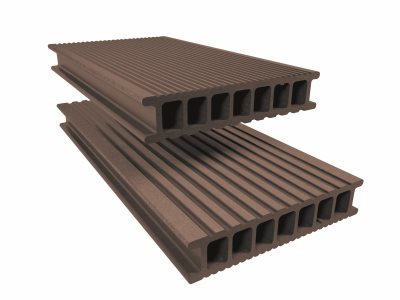Hollow WPC
In general, with hollow WPC you can also assume that high-quality products will contain a high proportion of wood. But the most obvious difference between the two WPC products is that the hollow panels have square or round holes. These are the openings to tunnels that run through the entire plank.
Because of the hollow design and the associated lower consumption of material, hollow WPC planks are less expensive than the solid alternative. Transport and installation are much easier thanks to the lower weight and because of the simple screw connection.
However, when choosing between hollow or solid WPC products, you must consider that, with the former, you need a suitable, solid substructure to ensure the necessary stability. This construction can be quite expensive.
You also need connection and angle profiles to prevent vermin and dirt getting into the hollow chambers of the WPC. Hollow WPC terrace planks are also not completely impervious to water unless they are installed with a slight slope. If water gets into the hollow chambers and freezes, the panels can be damaged. Therefore, when installing WPC terrace planks on small terraces or balconies make sure that there is a minimum slope of 1-2 per cent. The installation area should also not be subject to extreme fluctuations in temperature or moisture.
Hollow WPC terrace planks – an overview of the advantages and disadvantages:
Advantages:
Disadvantages:
-
Dirt and vermin can get into the hollow chambers
-
Water in the chambers can cause damage in the long term
-
Stable substructure required
